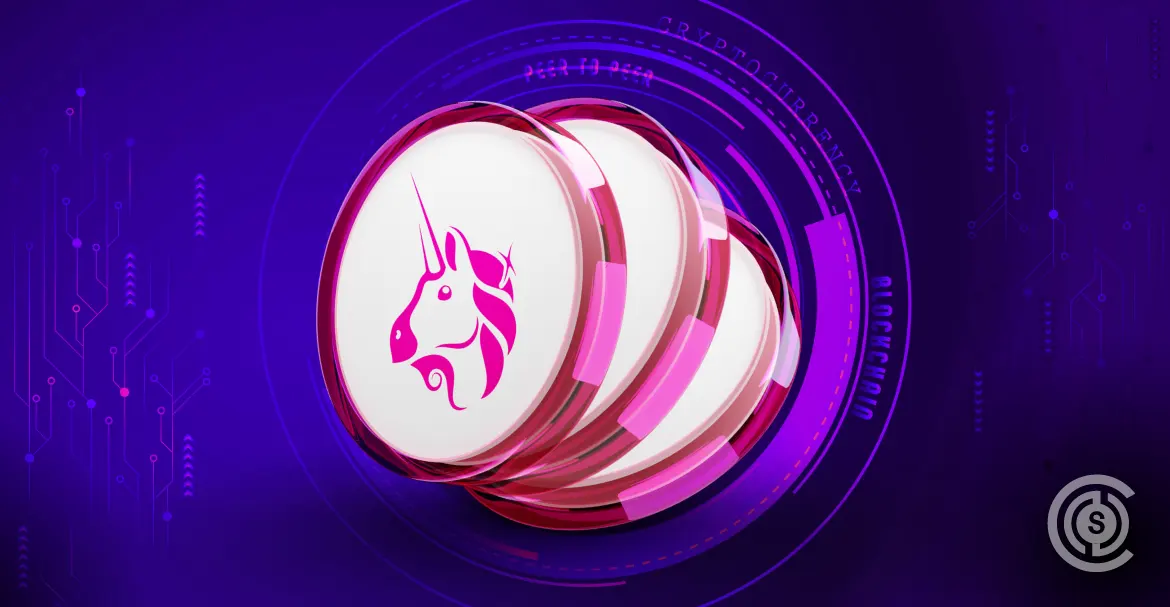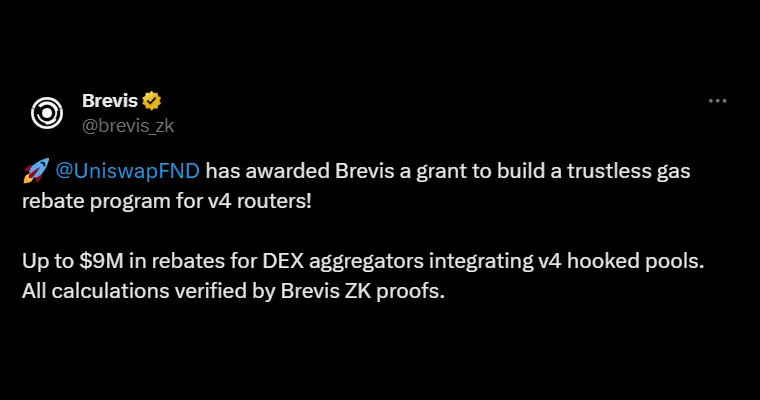Uniswap Grants $9M to Brevis for v4 Gas Rebate Program

Key Highlights:
- Uniswap Foundation grants $9M to Brevis to build a trustless gas rebate system for v4.
- Brevis uses zero-knowledge tech to verify off-chain rebate calculations on-chain.
- The main aim of the program is to boost liquidity, lower fees and improve swaps prices for the traders.
The Uniswap Foundation has announced a grant to blockchain infrastructure builder Brevis so that it can create a gas rebate program that will increase adoption of Uniswap v4, which is the latest version of the world’s largest decentralized exchange (DEX). The grant is worth $9 million, and it will reward DEX aggregators that route trades through Uniswap’s new “hooked” liquidity pools using a fully transparent and trustless rebate system that is powered by zero-knowledge technology.

Making v4 Adoption Easier and Fairer
Uniswap v4 was launched in early 2025 and is one of the most advanced upgrades to the Uniswap protocol. The protocol has introduced a new feature that is called “hooks” (smart contracts that allow developers to customize how liquidity pools behave). With these hooks, developers can add new features such as dynamic trading fees, automated market-making strategies, or MEV protection tools without fragmenting liquidity across multiple versions.
Even though these hooks are a new feature that are very helpful, but then again they also add complexity for DEX aggregators such as 1inch, 0x, and Velora. Aggregators route trades across multiple exchanges to give traders the best prices, but integrating Uniswap v4’s more flexible pool logic needs additional development effort.
The rebate program that is funded by the Uniswap Foundation aims to make this work more rewarding financially.
How the Rebate Program Works
Brevis will build a new gas rebates system that will help DEX routers recover transaction costs when they route trades via v4 hooked pools. Usually the routers pay Ethereum gas fees so they can execute trades. These transactions can be expensive and unpredictable. Under the new system, routers will receive rebates automatically and trustlessly, verified by cryptographic proofs rather than a centralized tracking database.
Here’s how the process works:
- The router executes trades through Uniswap v4 hooked pools.
- Brevis’s Zero-Knowledge (ZK) technology calculates the total gas cost that will be incurred by the router off-chain.
- Brevis generates a ZK proof which is a mathematical verification that confirms that all the data and the calculations are correct.
- The router then submits the proof on-chain to claim the gas rebate from a smart contract.
As every rebate claim is backed by cryptographic proof, there is no need for centralized record-keeping or manual oversight. The process makes sure that there is fairness, transparency and decentralization, which are the core principles of DeFi.
Powered by Brevis Zero-Knowledge Tech
Brevis’s zero-knowledge plays an important role in this setup. These tools allow complex calculations such as tracking and confirming gas fees across hundreds and thousands of transactions, run off-chain. With this approach, high gas fees can be avoided and keep blockchain-level security intact.
There is a staunch reason as to why Uniswap chose Brevis for this particular grant. The main reason is that Brevis’s system can securely calculate rebates off-chain and still prove the results on-chain.
Brevis quotes that its technology delivers “verifiable fairness at scale without centralized control,” offering a new blueprint for decentralized rewards programs.
Benefits Across the DeFi Ecosystem
This move could increase liquidity on the platform, tighter spreads, and better swap prices for its regular traders. As more routers and liquidity providers will join Uniswap v4, the pools will have increased trading volumes and more active price competition. That means trades can be executed with less slippage and at prices that are closer to the market average.
When routers pass on a portion of their rebates to the users, traders usually benefit directly through lower transaction fees. This creates a positive cycle, more participation is equal to more liquidity, which in return makes trading faster and cheaper.
Also Read: ReachMe Closes as BNB Chain Prioritizes Major Web3 Initiative


